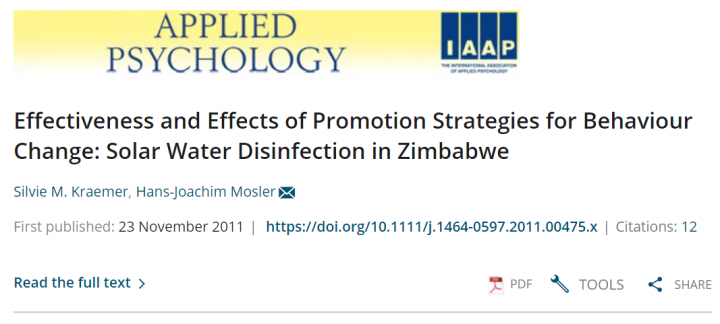Effectiveness and Effects of Promotion Strategies for Behaviour Change: Solar Water Disinfection in Zimbabwe
Kraemer, S., Mosler, H.-J. (2011)

Published in: 2011
Pages: 22
Publisher:
Applied Psychology
Author:
Kraemer, S., Mosler, H.-J.
Uploaded by:
SuSanA Admin
Partner profile:
common upload
952 Views
0 Downloads
Solar water disinfection (SODIS) is a sustainable method of water treatment. Despite the simplicity and many advantages of SODIS, past behaviour change campaigns have seen limited success. This study aims to compare intervention strategies in their efficiency in changing behaviour and to analyse which behavioural factors are differentially affected. The following factors were analysed in this study: intention, subjective norm, behavioural control, beliefs, habits, frequency of talking, knowledge and tension. The promotion strategies used in this intervention study were promoters, a pass-on task, prompts, public commitment and disseminating knowledge with inducing tension. Inhabitants of high-density areas near Harare, Zimbabwe, were interviewed at different points in time. High SODIS consumption was achieved when the promoter intervention was followed by a memory-aiding technique such as prompts or public commitment. Consequently, this combined-intervention strategy increased all behavioural factors and kept them at a high level. A continued pass-on task alone did not change behaviour and had decreasing effects on several behavioural factors. When the pass-on task was combined with disseminating knowledge with inducing tension, high SODIS water consumption was also reached, but several behavioural factors stayed at a low level. More effective intervention strategies are identified and discussed.
Bibliographic information
Kraemer, S., Mosler, H.-J. (2011). Effectiveness and Effects of Promotion Strategies for Behaviour Change: Solar Water Disinfection in Zimbabwe. Applied Psychology
Filter tags
Case studies in other formats English Sub-Saharan Africa















